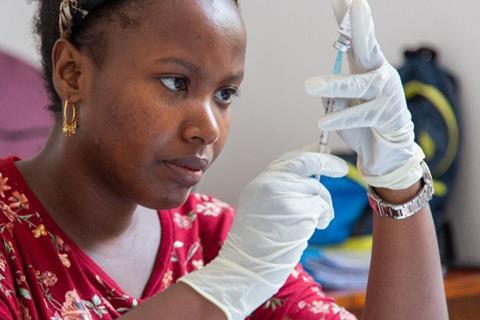[ad_1]

A malaria vaccine developed by researchers at the University of Oxford, UK, has been approved for use in Ghana, and provisionally approved in Nigeria, despite its final-stage clinical trial data not yet being reported.
The R21/Matrix-M vaccine, which has been manufactured and commercialised by the Serum Institute of India, is a protein-based vaccine that includes a saponin-derived adjuvant (Matrix-M) from Novavax to boost the immune response. The vaccine can be given to children aged 5–36 months, the group at highest risk of dying from malaria.
Results from Phase 2b trials in 2021–22, as well as preliminary data from the ongoing Phase 3 trial in Burkina Faso, Kenya, Mali and Tanzania, suggest that the vaccine is highly effective – exceeding the World Health Organization’s (WHO) goal of at least 75% efficacy, according to the Oxford team.
While granting its provisional approval, the Nigerian National Agency for Food and Drug Administration and Control communicated the need to expand the current trials to include a Phase 4 (post-marketing) trial and pharmacovigilance study in Nigeria. According to the 2021 World Malaria Report, Nigeria recorded the highest number of malaria cases (27% of the global total) and deaths (32% of the global total). Both infection and death rates in the country have increased since 2017.
Ghana is one of three African countries (alongside Kenya and Malawi) already involved in the WHO’s Malaria Vaccine Implementation Programme, which is beginning to roll out GSK’s Mosquirix (RTS,S S/A S01) vaccine, with funding from Gavi, the Vaccine Alliance. Mosquirix, which is about 30% effective at reducing malaria hospitalisations, was recommended for widespread use by the WHO in 2021.
An extensive roll-out of the R21 vaccine will likely require philanthropic funding to support manufacture and distribution. The Serum Institute of India has established potential manufacturing capacity of more than 200 million doses annually, including in collaboration with DEK Vaccines in Ghana.
[ad_2]
Source link
